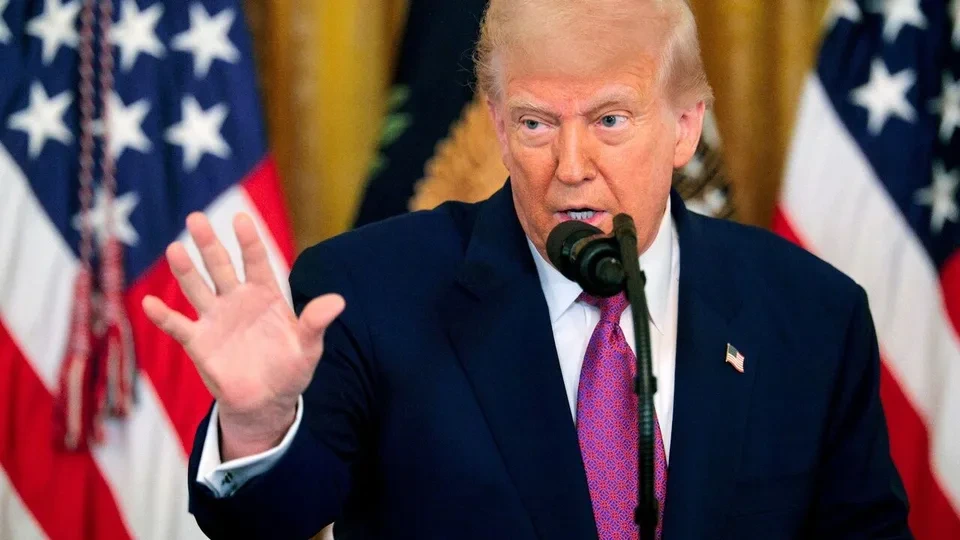He came, he bombed — and, according to President Donald Trump, he ended the war. Two days after American stealth bombers delivered a devastating strike against Iran’s nuclear infrastructure, Trump declared a “complete and total” ceasefire between Israel and Iran.
“I would like to congratulate both Countries, Israel and Iran, on having the Stamina, Courage, and Intelligence to end, what should be called, ‘THE 12 DAY WAR,’” he wrote on Truth Social.
According to media reports, Trump first secured Israel’s consent and then conveyed the ceasefire proposal to Iran via Qatari intermediaries. Iran was to halt hostilities first, followed by Israel 12 hours later. Both sides, Trump stated, had pledged to remain “PEACEFUL and RESPECTFUL.” Speaking to NBC News, he expressed confidence that the ceasefire would last “forever.” Markets reacted with relief: stocks rose, oil prices dropped. Iran’s foreign minister admitted there was no formal agreement but said Iran would stop if Israel did. Still, when the ceasefire deadline passed, an Iranian missile salvo killed three people in southern Israel — likely a final act of defiance.
From Secret Strike to Sudden Peace
The diplomatic breakthrough capped a dramatic series of events that began on June 13th, when Israel launched a surprise assault on Iran. Israeli air force jets and intelligence teams dismantled air defenses, assassinated nuclear scientists and generals, and crippled Iran’s dispersed nuclear infrastructure, which had brought the country to the brink of acquiring nuclear weapons.
On June 22nd, the U.S. entered the conflict with Operation Midnight Hammer. B-2 bombers flew 37 hours from Missouri, dropping 14 GBU-57 “Massive Ordnance Penetrator” (MOP) bombs on uranium enrichment sites in Natanz and, most notably, Fordow. Simultaneously, approximately 30 submarine-launched Tomahawk cruise missiles targeted Iran’s nuclear complex in Isfahan.
Iran’s response was symbolic: 14 missiles — one for each American bomb — were fired at the al-Udeid air base in Qatar. All but one were intercepted. Thanks to prior warnings, there were no casualties. Two hours later, Trump announced the ceasefire.
An American Victory, an Iranian Wound
Vice President J.D. Vance, who was live on Fox News during the announcement, stated the mission had succeeded: “We know that they cannot build a nuclear weapon.” He claimed Iran’s enriched uranium reserves were likely buried in the bombing.
But will the ceasefire hold?
According to The Economist, both sides have strong reasons to stop fighting. For decades, the Iranian regime has chanted “Death to America” while avoiding direct confrontation with Washington, preferring proxy warfare. Today, its military appears powerless against Israel, its regional allies are weakened, and domestic discontent is rising. With America now directly involved, Iran may prefer to lick its wounds.
As for Israel, Prime Minister Binyamin Netanyahu is unlikely to oppose President Trump after praising his “historic intervention.” According to Israeli military sources, nearly all high-priority targets were eliminated. Some believe Israel may even declare victory unilaterally, without a formal ceasefire. Netanyahu may view this as a legacy-defining win against Israel’s archrival.
And for Trump, prolonging the conflict would contradict his promise to avoid another “forever war” like Iraq or Afghanistan — wars he has frequently condemned.
The Nuclear Question Lingers
Still, Iran won’t forget the knowledge it has acquired. Supreme Leader Ayatollah Ali Khamenei, humiliated and resentful, may now be more convinced than ever that nuclear weapons are essential for the regime’s survival. Even if its facilities were destroyed, the program could be resurrected in secret.
The IAEA says it does not know the location of Iran’s official stockpile of 400kg of uranium enriched to 60%. If Iran has hidden enrichment centrifuges, it could rapidly reach weapons-grade enrichment (90%). That would be enough for at least ten nuclear bombs.
The 2015 nuclear deal, signed by President Barack Obama, allowed Iran limited enrichment under international inspection, designed to keep it a year away from obtaining bomb-grade material. Trump withdrew from the deal during his first term. On the eve of Israel’s strike, Iran was reportedly just days or weeks away from nuclear “breakout.” Intelligence also suggested Tehran had begun developing a warhead capable of being mounted on a missile.
In recent talks, Trump demanded “zero enrichment.” His envoy, Steve Witkoff, proposed a face-saving compromise: Iran could enrich uranium as part of a regional consortium outside its borders. It’s unclear whether that offer still stands — or whether either Iran or Israel would accept it.
Can the Region Truly Stabilize?
The broader question remains: can the Middle East stabilize as long as Tehran is ruled by revolutionary clerics? If Israel detects any secret restart of Iran’s nuclear program, it will strike again — with or without U.S. backing. It also wants restrictions on Iran’s conventional weapons and its proxy support, after a year of missile fire from Iran, Lebanon, and Yemen.
Some in Israel and the U.S. believe true calm is only possible if Ayatollah Khamenei is removed. On June 23rd, Israel tried to undermine Tehran’s internal security forces by bombing the notorious Evin prison and the headquarters of the Basij militia, responsible for suppressing protests. But ordinary Iranians didn’t heed Israeli calls to rise up — hardly surprising while bombs were falling. However, if the violence ends, and people begin tallying the cost of the Supreme Leader’s errors, internal unrest may follow.
Until then, Israel and its Arab allies will insist the U.S. continue underwriting regional security.
America: Still Indispensable?
Operation Midnight Hammer reaffirmed America’s unique military role. Yet within Trump’s administration, many support scaling back U.S. involvement as global policeman, and focusing resources on countering China in the Pacific.
As J.D. Vance put it, “The nature of Iran’s regime is for the Iranian people to decide.” But he added: “If Iran is desperate to build a nuclear weapon in the future, then they’re going to have to deal with a very, very powerful American military.”
Thus far, a dramatic military operation followed by a dramatic ceasefire does not equal lasting peace. The war may be over — for now — but the Middle East remains on edge.
This article was prepared based on materials published by The Economist. The author does not claim authorship of the original text but presents their interpretation of the content for informational purposes.
The original article can be found at the following link: The Economist.
All rights to the original text belong to The Economist.


















